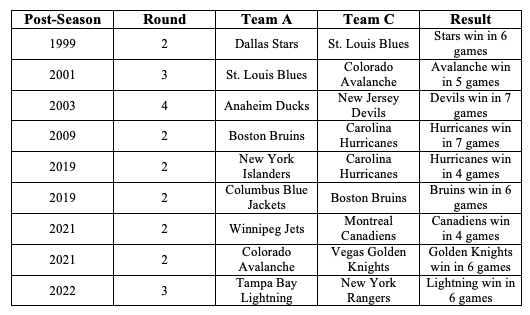Is Rest Actually Beneficial in the NHL?
As series are finishing up in a given round, you will often hear people talking about how one team is rested up, having swept their series, or perhaps won in five games, and will likely be much more energized and ready to pounce on their opponent who just finished their series that went to seven games two or three days ago. However, this assumption that rest must automatically be good isn’t exactly accurate.
Since the salary cap era began in the 2005-2006 season, there have been a total of 126 series after the first round. In other words, there have been 72 second round series, 36 third round series, and 18 Stanley Cup finals. Of these 126 series, only three had the situation where both teams finished their previous series on the same day, resulting in 123 series where one team had more rest than another. Of these 123 series, the more rested team won only 43.1% of the time, which goes against the common sense belief that rest is a good thing.
Breaking it down round by round, the more rested team won 42.9% of the time in round two. In the third round, the more rested team saw its highest success rate of 51.4%. The Stanley Cup Finals saw the most significant impact, with more rested teams after the Conference Finals winning the Stanley Cup only 27.8% of the time.
When looking at the most extreme example of when a team that sweeps meets a team that won their previous series in seven, it becomes more clear that rest is not necessarily a good thing. In other words, team A sweeps team B and meets team C in the next round who beat team D in seven games.
Team A swept their opponent in the previous round. Team C beat their opponent in seven games in the previous round. Team A and C meet in the next round.
As seen, 1999 was the last time team A won the series in this situation until the Lightning broke the seven series losing streak in 2022. Even when we disregard the most extreme example, teams that play the full seven games have the highest success rate in the following round compared to winning in four, five, or six games.
So why is more rest seemingly worse than less rest? The most logical answer would be that teams waiting nearly a week for a round to end before starting the next round lose their rhythm. In other words, it is actually rust, not rest. After all, it is impossible to emulate a playoff game in practice, so suddenly getting back into competitive mode can be challenging. Additionally, it is no secret that after long breaks in the regular season, such as Christmas break or the All Star break, teams are usually playing sloppier hockey in their first games back. During the playoffs, teams that finish their series early would essentially be putting themselves through an All Star break each time they finish a series in five or less games. This is not to say teams should purposefully lose a game if they are up 3-1 and have a chance to move on in five, but is rather an unfortunate scheduling logistic with no way around it. On the contrary, it is widely known that regular season back-to-back games are also difficult, having just played the day or night before. However, in the Stanley Cup Playoffs, there are rarely ever any back-to-back games, and certainly never going from one series to the next. As a result, too little rest is not necessarily an issue.
So is rest ever good? While being in a rhythm seems to be the key to the success of unrested teams, one key situation that likely would be beneficial for a team to have rest is day-to-day injuries. These are injuries that are more of the nagging variety and wouldn’t need immediate surgery or long-term rest. If one player has a slight injury but gets to rest for a week until the next series starts, those extra days could be the difference between playing in game one or being out longer.
Overall, is rest the be all end all for predicting the following round? No. However, this common belief that a well rested team should have the advantage in the following round is inaccurate. While great teams will find a way to win no matter what, the statistics support the idea that having less rest and therefore being in a rhythm is a net positive, and is a statistic that can be used in conjunction with other variables to make predictions for the following round.

